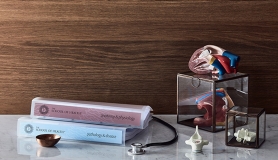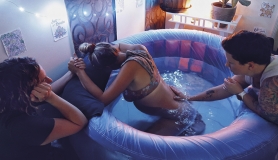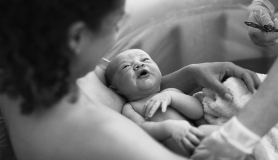The transition into motherhood is a time of profound change and transformation on every level: emotionally, mentally, physically and spiritually.
It is also a time of conflicting emotions: both positive and negative are fluctuating in a heady mix of hormones and sleep-deprivation - absolute joy, bliss, wonderment, exhaustion, irritation, sadness and maybe grief.
BIRTH OF THE MOTHER
But with the birth of every child, whether it be her first or her fifth, a new mother is born. She is as open, raw and vulnerable as her newborn baby. Just as her baby needs warmth, nurturing and the correct rehydration and nourishment, so too does the mother. Just as her baby needs to feel protected, cared for and held, so does she. A new mother is a precious cargo, in need of love, support, understanding, kindness and gentleness.
The modern care of the mothering journey in the West is primarily focussed on the mother; her pregnancy and birth. However, once baby is here, mothers are relegated to second place. Health professionals focus on baby’s development and families, who often live far away, visit expecting cups of tea and cuddles with the new baby and buy expensive presents but the mother is given little of the nurturing and care she truly needs.
In contrast across Asia and Africa they have held onto ancient natural traditions and practices that understand the importance of pregnancy, birth and the 6 week postpartum period.
MAGIC OF AYURVEDA
India has its own natural and complete healthcare system called Ayurveda. Put simply it is the art of living in harmony with nature; your unique nature, the cycles of nature in the day, year, season and the different stages of life.
Ayurveda believes that the key to a happy home life, is a happy mother. According to Ayurveda, the first 42 days postpartum (6 weeks) is a sacred window of time that, dependant on how she is cared for at this time, can affect a woman’s health positively or negatively for the next 42 years of her life.
In India the extended family and community rally around the new mother, relieving her of domestic duties, cooking for her, massaging her and bathing her and caring for her other children for a period of six weeks. This gives the new mother one job only; to rest, bond with and feed her new baby.
As an Ayurvedic Practitioner myself I knew that this was the kind of postpartum care I craved and needed when I became pregnant with my first baby.
I had followed Ayurvedic protocol for at least a year, conceived within 6 weeks and had an easy and healthy pregnancy so I knew it worked. I fought for a home birth (I had had Group B Strep) and got it as I treated myself and refused to follow ‘just in case’ NHS protocols.
I birthed my son at home (having moved in the day before!) within 7 hours with no pain relief - just Ayurvedic warm oil massage and a hypnobirthing CD.
So far so good I thought. Check me out, I have this natural Ayurvedic birthing and mothering thing nailed! It really works! What I hadn’t banked on was the vulnerability of being a newborn mother.
POSTPARTUM PERIOD
We were happy at home. I was confident and in tune with my new baby and felt at ease resting in the comfort of my own bed.
But when a midwife came along to visit later that day and suggested we go in to hospital as he was small, not feeding yet (this is normal but nobody told me that) and given the potential of Group B Strep he should have his blood sugars monitored. And when a second opinion at the hospital advised the same, I somehow lost my nerve and my power.
Inside I was screaming “I don’t want to go!”. But the words didn’t come out. Not to my own mother who was there. Not to my partner. Not to the midwife. I just couldn’t speak.
And neither did my partner speak up but I could hear him effing and jeffing trying to fit a borrowed car seat that we didn’t anticpate needing. He had lost his power too.
We ended up in the hospital I never wanted to be in for two days.
But because things weren’t going well (as they kept interfering in his feeding) and he wouldn’t latch well we were transferred to the natural birthing centre where we ended up staying for another 5 nights. Another place I didn’t want to be in.
Normally the centre was quiet but this was an exceptional week and there were 6 of us – in one room. Six screaming babies all night meant I had no sleep AT ALL, apart from maybe 1-2 hours in the early evening before my partner had to leave.
My postpartum care went out of the window. I didn’t gently rekindle my digestive fire or eat my special Ayurvedic warm, heavy and oily postpartum food. I ate awful hospital food that gave my baby wind (cabbage!). I didn’t rest or sleep or relax. I didn’t have any of the warm oily massages my body and soul desperately needed and I came home 7 days after my wonderful home birth a complete and utter car crash. A mother who bore no resemblance whatsoever to that relaxed new mother in the first few hours at home post birth.
FEELING BLUE
When I got home, I felt nervous. From feeling confident on my own I had relied on a team of midwives to support me with my difficult-to-feed newborn. I walked into the room I had given birth in and it all hit me like a massive breeze block colliding with my face. My partner had not done a thing with it, it lay as it was a week before when I had birthed in it.
That night I stayed up by myself in the downstairs toilet as my heart cracked open – the first time it had felt utterly broken. I’d never felt like that before and I wailed and cried like a wild animal, these noises emanating from my physical body that weren’t coming from me, but I couldn’t stop them. I just witnessed these primal sounds that needed to come out and felt the pain and utter grief when I realised what I could have had, had I stayed at home. If the midwife had just left me alone and used some common sense and seen that we were just fine where we were. If she had not needed to tick a box and cover her back. And where had my voice gone that day? I felt such rage and despair, both at her and at myself.
Due to the incredibly rocky start that week, for the next few months I felt ALL the symptoms of high Vata (or wind) imbalance: completely drained, anxious, ungrounded, sleepless, paranoid and irritable which, when left untreated, can culminate in post natal depression.
And when new mothers have high Vata, so generally do their babies and mine was no exception. He was colicky, unsettled, crabby and never slept, just the same as me.
If you’d asked me the question: do you have post-natal depression?
My answer would have been a very clear and indignant “No!”
I did not relate to that description but looking back I probably did have some. I loved my son dearly and was completely connected to him but was I enjoying the lack of sleep, the constant screaming and feeling constantly anxious about leaving the house with him crying? No I was not. If you’ve never had a screamer, it’s hard to know the stress it brings out. The feeling of almost going demented with lack of sleep and lack of peace when awake is like torture.
START BY NURTURING THE MOTHER
In Ayurveda to treat baby, you start by treating the mother.
Despite knowing all the theory of how to treat myself, I could not get a grip of myself to do the things I needed to do physically and there was no one nearby who knew what to do for me from an Ayurvedic perspective. The sleep deprivation, exhaustion and mental self-sabotage had got a hold. And so the downward spiral continued until my back gave way after 6 months – just as my partner was going away to Ireland to work for a week! I was broken.
Three good friends stepped in to help me – help me change him, feed me and stay with me in the day and help me deal with the constant crying and refusal to sleep in the evening. And something finally shifted.
Ayurveda says that those first 42 days can determine a woman’s health for the next 42 years. I must admit that 9 years later I still feel that I have a significant Vata imbalance that if I don’t correct, can spiral out of control with little effort.
The pain and grief of losing my first week at home and a difficult first 6 months of motherhood took me a while to recover from, despite having a very different and positive postpartum experience with my second baby. This is why I never want any other mother to feel the way I did. I’ll never know if my baby would have been more settled if we’d stayed at home. But I would have been. And when mothers are calm and relaxed, babies often are too. Like increases like is another universal law used by Ayurveda.
REJUVENATION TIME
We need to return to nature’s ways of taking care of and nurturing our new mothers to combat the epidemic of exhaustion, loneliness, isolation and maternal mental health issues that we face in the West. We need to bring people on board to help hold and honour this sacred time where we need to rest and bond and just watch the outside world keep turning as we turn inwards, to attend to our new baby’s needs, our self-care and rest.
For the new mother to emerge resplendent, colourful and bright as a butterfly, rejuvenated and ready to face the world and take on this new charge she has successfully carried and birthed, she first needs the cocoon; the chrysallis in which this profound and important transformation from woman to mother takes place.
Vanessa is a mother, Ayurvedic Practitioner, birth & postnatal doula and Pregnancy & Postnatal Coach. Touched by the deeper things in life, she is passionate about nurturing healthy, happy, conscious mothers.
MORE INSPIRATION







